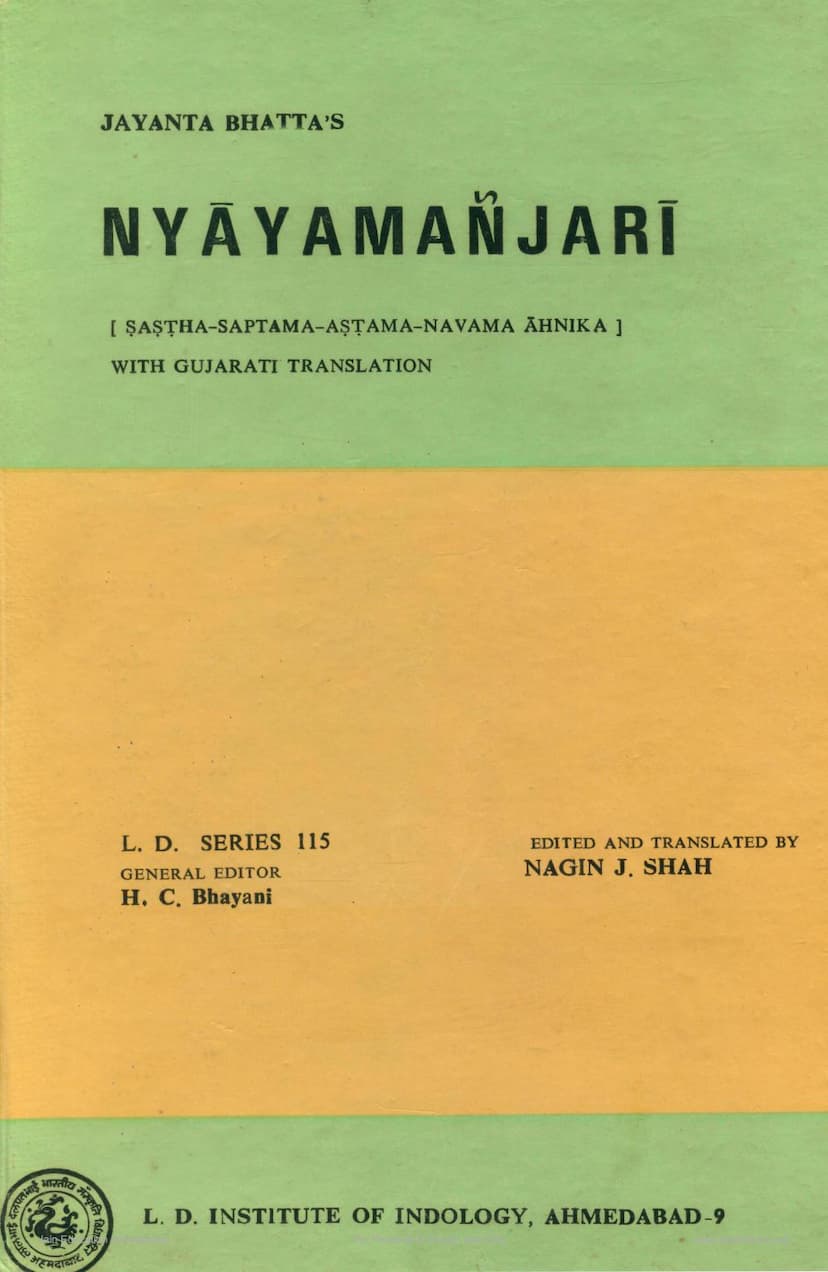Nyayamanjari Ahanika 06 07 08 09
Added to library: September 2, 2025

Summary
Here's a comprehensive summary of the provided Jain text, "Nyayamanjari Ahanika 06 07 08 09" by Jayanta Bhatt, edited and translated by Nagin J. Shah:
This volume presents the sixth through ninth ahnikas (sections) of Jayanta Bhatta's influential Nyāyamañjarī, a foundational text in the Nyāya tradition of Indian philosophy. The work, originally composed in Sanskrit, is made accessible to Gujarati readers through an authentic and lucid translation by Dr. Nagin J. Shah.
The Nyāyamañjarī, while formally a commentary on Gautama's Nyāyasūtras, significantly expands upon and often critiques rival philosophical positions. It primarily focuses on the crucial topics of Pramāṇa (means of valid knowledge) and Prameya (objects of valid knowledge), delving deeply into fundamental philosophical issues debated across various Indian philosophical schools. Jayanta Bhatta's erudition and intellectual brilliance are evident in his sharp critique of opposing views and his strong corroboration of the Nyāya perspective, all presented with remarkable clarity and a lively style. He demonstrates modesty and tolerance, advocating for the tolerance of all serious faiths, even while critiquing their positions.
This specific volume covers four ahnikas, continuing the series previously published by L. D. Institute of Indology, Ahmedabad. The General Editor, H.C. Bhayani, congratulates Dr. Shah for his scholarly endeavor in bringing this important work to successful completion.
Here's a breakdown of the philosophical discussions within each ahnika included in this volume:
Sixth Āhnika:
- Sphota Theory vs. Word Realism: The sixth ahnika extensively discusses the sphoṭavāda (the theory that sound is eternal and undivided, and meaning is conveyed by this indivisible entity) of the Grammarians. Jayanta Bhatta thoroughly refutes this theory, arguing that words are ultimately composed of sounds (varna). He examines various aspects of language and meaning, including:
- The definition of a word (pada) and a sentence (vākya).
- The inadequacy of sphoṭavāda as it posits an entity beyond sensory perception and inference.
- The process by which letters (varna) combine to form words, convey meaning, and ultimately lead to sentence meaning (vākyartha). He critiques the abhihitānvayavāda (meaning of words is prior to sentence meaning) and anvitābhidhānavāda (sentence meaning is prior to word meaning) of the Mimāṁsakas, establishing the Nyāya position that words, while conveying individual meanings, ultimately derive their significance in the context of the entire sentence through their tātparyaśakti (intent-power).
- The debate on whether the meaning of a word is its form (ākṛti), universality (jāti), or individual instance (vyakti).
- The refutation of the claim that the study of grammar is ultimately fruitless. Jayanta Bhatta establishes the purposefulness of grammar, discussing key questions like the distinction between correct (sādhu) and incorrect (asādhu) words, the nature of this distinction, and how to ascertain it.
Seventh Āhnika:
- The Nature of Prameya (Objects of Knowledge) and the Self (Ātman): The seventh ahnika focuses on prameya, particularly the ātman (Self) which is central to achieving liberation (mokṣa).
- Jayanta Bhatta argues against the Cārvāka view that there is no ātman, establishing its existence. He criticures theories that attribute consciousness to the body (śarīracaitanyavāda), senses (indriyacaitanyavāda), or mind (manascaitanyavāda).
- He then thoroughly refutes the Buddhist doctrine of momentary existence (kṣaṇabhaṅgavāda), arguing that it leads to insurmountable problems in explaining causality and continuity. He establishes the Nyāya position of a permanent, all-pervading, and self-luminous ātman.
- The ahnika includes a detailed examination of the arguments for and against the ātman's existence, its permanence, and its consciousness.
Eighth Āhnika:
- Prameya Analysis and the Nature of Reality: The eighth ahnika delves into the analysis of various prameyas, extending the discussion beyond the ātman to a broader examination of the world and its constituents.
- It includes an examination of the body (śarīra), senses (indriya), their objects (indriyārtha), intellect (buddhi), mind (manas), action (pravṛtti), place (deśa), post-mortem existence (pretyabhāva), fruit (phala), and suffering (duḥkha).
- Within the discussion of buddhi, Jayanta Bhatta critiques the Sāṁkhya doctrine of satkāryavāda (the effect pre-exists in the cause), arguing for the Nyāya understanding of buddhi.
Ninth Āhnika:
- Mokṣa (Liberation): Its Nature and Means: The ninth ahnika is dedicated to the ultimate goal of liberation (mokṣa).
- It explores the nature of mokṣa, discussing various views on how to achieve it. Jayanta Bhatta critically examines the means to liberation, including knowledge (jñāna) and action (karma).
- He elaborates on the Nyāya tenet that knowledge of reality (tattva), specifically self-knowledge (ātmajñāna), is the direct cause of mokṣa.
- He engages with and refutes the views of rival schools like Advaita Vedanta, Śabdādvaita (eternalism of sound), Vijñānavāda (idealism), and Śūnyavāda (nihilism) regarding the ultimate nature of reality and the path to liberation.
- The discussions on the nature of mokṣa include its relationship with happiness, the role of consciousness, and the refutation of cyclical existence theories that do not account for liberation.
In essence, this volume of Nyāyamañjarī provides a deep dive into the core Nyāya epistemological and metaphysical concepts, showcasing Jayanta Bhatta's mastery of philosophical debate and his contribution to the enduring Nyāya tradition. The translation by Dr. Nagin J. Shah ensures that these complex philosophical arguments are accessible to a wider audience.